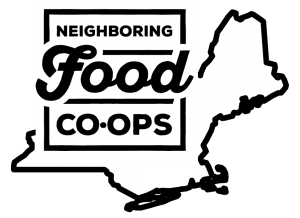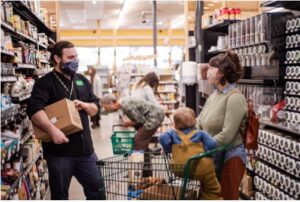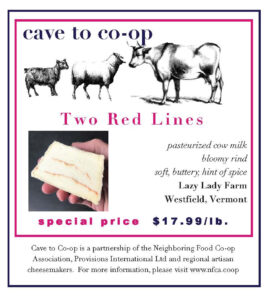 Your Neighboring Food Co-ops
Your Neighboring Food Co-ops
Locally Owned by More Than
150,000 People Like You!
In this Month’s E-News, check out:
- Celebrating Black History Month
- Meet NFCA’s New Staff Member
- Welcome Belfast Co-op!
- Farm to Freezer: Locally Grown Comfort Foods
- February’s Cave to Co-op Special
- Farmers Union Applauds Food & Agriculture Support Package
- Co-op Calendar
Celebrating Black History Month
Black History Month is an important occasion for us all to learn more about the African American experience in the United States — to understand the history, honor the struggles, celebrate the contributions, and recommit ourselves to the work of creating a more just and inclusive economy and society.
For co-operators, February is an especially valuable opportunity to learn more about the history of co- operative enterprise in African American communities, explore the contribution of the co-operative movement to multiracial struggle for Civil Rights and economic democracy, and continue to challenge ourselves to live up to our values and principles. Across our region, food co-ops are engaging their members in this dialog, building relationships with community organizations focused on racial justice and voting rights, and working with their Neighboring Food Co-ops to share resources and ideas as we work to build a more just and inclusive economy and society.
operative enterprise in African American communities, explore the contribution of the co-operative movement to multiracial struggle for Civil Rights and economic democracy, and continue to challenge ourselves to live up to our values and principles. Across our region, food co-ops are engaging their members in this dialog, building relationships with community organizations focused on racial justice and voting rights, and working with their Neighboring Food Co-ops to share resources and ideas as we work to build a more just and inclusive economy and society.
On the national level, the National Cooperative Business Association (NCBA CLUSA) is joining co-operators nationwide in celebrating the essential contributions of Black co-operators to our movement and amplifying the voices of today’s change makers, including recorded sessions from the 2020 Cooperative IMPACT Conference. Cooperatives have long been used as a tool to establish deep roots in communities and give everyone the opportunity to meaningfully participate in their society and economy. Black communities in particular have historically used cooperatives as a strategy for shared economic advancement in the face of incredible odds.
Interview with Cornelius Blanding, Federation of Southern Cooperatives / Land Assistance Fund
As part of this celebration, we are also sharing this interview with Cornelius Blanding, Executive Director of the Federation of Southern Cooperatives / Land Assistance Fund. Conducted by NFCA Executive Director Erbin Crowell as part of the International Centre for Co-operative Management recent training on Member-centric Governance & Management, the interview explores the work of the Federation and its intersection with the movement from Civil Rights in the South, and the potential for co-operative associations to work together for greater justice.
The Challenge of Achieving Racial Equity
At NCBA CLUSA’s 2020 Co-op Impact Conference, professor and historian Jessica Gordon-Nembhard dispels the notion that “co-ops can’t be racist,” noting that the movement’s fundamental grounding in open membership and democratic member control are not enough to offset the cumulative effects of structural and institutional racism—particularly in the U.S.
Co-operatives Can Advance DEI: Lessons, Issues & Ways Forward
In this session from NCBA CLUSA’s 2020 Co-op Impact Conference, Moderated by National Cooperative Bank’s Senior Vice President of Corporate Affairs John Holdsclaw IV, leaders from across the co-operative landscape discuss the state of diversity, equity and inclusion in the U.S. and the co-op movement, with a focus on how sectors are raising awareness, stimulating conversations and taking concrete steps to advance DEI work.
The Neighboring Food Co-op Association (NFCA) is proud to expand our team to deepen our capacity to fulfill our vision of a thriving, co-operative economy and a healthy, just food system!
We’re excited to welcome Alexis Alexander as the latest addition to our NFCA staff team! In her new role,  Alexis will be working part time to support us in our expanding peer collaboration efforts, healthy food access and DEI work, and other technical support as needed.
Alexis will be working part time to support us in our expanding peer collaboration efforts, healthy food access and DEI work, and other technical support as needed.
In her role as Membership Manager of GreenStar Food Co-op, Alexis was actively engaged with NFCA for the past six years and is perhaps best known for spearheading GreenStar’s FLOWER healthy food access program and playing a key role in the co-op’s multifaceted approach to diversity, equity and inclusion (DEI), which successfully increased the diversity of both GreenStar staff and membership. She’s been an active participant on our quarterly HFA conference calls and presented at our 2017 Annual Meeting alongside GreenStar’s former president Patrice Lockert Anthony and NCG’s Terry Bowling, speaking specifically about GreenStar’s FLOWER and DEI efforts.
In addition to those efforts, in her 11 years as Membership Manager, Alexis helped to grow GreenStar’s membership base, increase member engagement in the Co-op through enhanced membership programming and events, and improve systems and processes for tracking, Prior to her career in the Co-op world, she gained experience in business and retail management, training and development, and consumer marketing research, working predominately in the supermarket and consumer packaged goods industries. Alexis received a BS in Nutritional Sciences from Cornell University and an MBA in Marketing from Michigan State University.
Alexis is ecstatic about her new role, stating “I’m so thrilled for the opportunity to serve NFCA co-ops in a greater capacity as we work together to grow and strengthen co-operatives in our region, and make our co-ops more welcoming to all. Some of my most favorite moments in the co-op world have been engaging with others from NFCA affiliated co-ops.”
Please join us in welcoming Alexis to our team!!!
The Neighboring Food Co-op Association (NFCA) is proud to welcome Belfast Co-op in Belfast, ME, as its newest member! The co-op is the third Maine co-op to join NFCA.
The Belfast Co-op is an outgrowth of a grassroots effort by 70’s-era back-to-the-landers seeking access  to good food at a fair price. Today, the Co-op is proud to be an anchor of downtown Belfast and to be a vibrant hub for Maine’s strong local food movement. Entering their 44th year, the Co-op’s sales surpassed $9 million, and the co-op is actively supported by over 4,200 co-operative member-owners. At Belfast Co-op, they love local food – in 2020, a third of all sales were from products provided by local farmers and food makers!
to good food at a fair price. Today, the Co-op is proud to be an anchor of downtown Belfast and to be a vibrant hub for Maine’s strong local food movement. Entering their 44th year, the Co-op’s sales surpassed $9 million, and the co-op is actively supported by over 4,200 co-operative member-owners. At Belfast Co-op, they love local food – in 2020, a third of all sales were from products provided by local farmers and food makers!
“During the pandemic, we relied on the Co-operative Principles and Values for guidance and they have been invaluable to our success. We’re excited to support NFCA to embody Principle 6: Cooperation among Co-ops! Looking to our sister co-ops has provided us with a robust network of fellow businesses and professionals to help us navigate these turbulent times. We look forward to working with NFCA to help strengthen and build the co-operative movement in Maine, New England, and the country as a whole.” – Jamie Cermak, Belfast Co-op Marketing Manager
The NFCA includes over 45 food co-ops and startups across the Northeast that are working together toward a vision a thriving co-operative economy, rooted in a healthy, just, and sustainable food system and a vibrant community of co-operative enterprise.
For a map of your Neighboring Food Co-ops, please visit: https://nfca.coop/members
Farm to Freezer: Locally Grown Comfort Foods
Preparing and sharing comforting foods in stressful times is a way to feed our souls as well as our nutritional needs.
A variety of foods appeal to people as comfort foods, though generally across cultures, soups, or  creamed or saucy dishes tend to invoke a nostalgic or sentimental value, characteristics inherit in a comfort food. Taking time to shop at your co-op for the ingredients you need to create your comfort foods, including Neighboring Food Co-op Association Frozen Fruits and Vegetables contributes to your health as well as to the health of our community and family farms.
creamed or saucy dishes tend to invoke a nostalgic or sentimental value, characteristics inherit in a comfort food. Taking time to shop at your co-op for the ingredients you need to create your comfort foods, including Neighboring Food Co-op Association Frozen Fruits and Vegetables contributes to your health as well as to the health of our community and family farms.
Creamed corn is not hard to make and a comforting addition complementing meat, potatoes, or as a base for corn bread or frittatas. Like all recipes there are many ways to make it. A quick internet search yields multiple variations. But to keep it easy to prepare and with limited ingredients and easily substitutable for dietary needs, we offer Homemade Creamed Corn recipe using NFCA Frozen Sweet Corn and co-op produced ingredients.
Your local food co-op works hard to offer products that strengthen local economies, support sustainable agriculture, and grow community ownership. Our frozen Blueberries, Green Peas and non-GMO Sweet Corn are all produced, picked, processed, and packed right here in the Northeast.
For more Farm to Freezer information and recipes — including comfort foods — visit: www.nfca.coop/farmtofreezer.
Homemade Creamed Corn
With just a few ingredients that you likely have on hand already, this homemade cream corn recipe is quick to prepare. Substituting vegan butter and coconut milk works well for a vegan version.
Ingredients
- 2 cups corn (10 oz pkg frozen NFCA Corn) defrosted
- 3 tbs butter
- ¾ cup milk
- ½ tsp salt
- 1 tbs cornstarch
- 1 tbs nutritional yeast (optional)
In saucepan melt butter. Stir in corn and milk. Sprinkle nutritional yeast, salt and cornstarch. While stirring constantly bring just to a boil, reduce to low and simmer 8-10 minutes. Remove from heat. With an immersion blender, give a couple of blends to puree some of the corn. Ready to serve.
February’s Cave to Co-op Special
Two Red Lines, Lazy Lady Farm, Westfield, VT
Two Red Lines is a small, soft, rounded pyramid that has its namesake lines running through the paste and a layer of ash hiding under the rind.
and a layer of ash hiding under the rind.
Laini Fondiller started Lazy Lady in 1987 and it is as eclectic and unique as Laini herself. While not certified organic, the farm operates using organic practices: organic grains, organic straw for bedding, intensive rotational grazing, and fertile soils made from composted manure and the added minerals for hay production.
Laini operates the farm with 17 solar panels and a 1K-wind generator. When there is no wind or sun, Lazy Lady relies on a small generator to replenish the battery bank. Laini raises and milks a herd of over 40 registered Alpine goats, a far cry from the handful of sheep and one goat named Blooper that she started with 25 years ago. Then, the farm was operated with candles, gas lamps, hand water pumps, outdoor privy and a car battery for running a radio.
Laini is regarded across the country as an American cheesemaker who has remained true to the art of the profession and the lifestyle of a small farmer. Working 60+ hours a week, Laini answers to no one but herself and that herd of goats.
Two Red Lines is perfect for just eating by the wedge just off your knife, and also check out these recipes on February’s Cave to Co-op page.
Each month our Cave to Co-op partnership between Provisions International and the Neighboring Food Co-op Association (NFCA) offers a delicious regional cheese featured at a great price. Strengthening our local and regional farmers and producers by supporting artisanal cheesemakers is a key goal of the Cave to Co-op program.
Farmers Union Applauds Food & Agriculture Support Package
 Americans, and rural communities, including $3.6 billion to protect food and farm workers, redirect surplus commodities to food banks, and build resilience in the food supply chain. Additionally, it would extend a 15 percent boost in Supplemental Nutrition Assistance Program (SNAP) benefits through the end of September, facilitate the distribution of vaccines to rural health care providers, help small-scale meat processors by offsetting the cost of overtime inspection, provide farm loan assistance to socially disadvantaged farmers, and award funding to minority-serving institutions, among other things.
Americans, and rural communities, including $3.6 billion to protect food and farm workers, redirect surplus commodities to food banks, and build resilience in the food supply chain. Additionally, it would extend a 15 percent boost in Supplemental Nutrition Assistance Program (SNAP) benefits through the end of September, facilitate the distribution of vaccines to rural health care providers, help small-scale meat processors by offsetting the cost of overtime inspection, provide farm loan assistance to socially disadvantaged farmers, and award funding to minority-serving institutions, among other things.
For More Co-op Events, Visit https://nfca.coop/calendar
The Neighboring Food Co-op Association (NFCA) is a co-operative federation of 45 food co-ops and startup initiatives across New England, working together toward a shared vision of a thriving co-operative economy, rooted in a healthy, just, and sustainable food system and a vibrant community of co-operative enterprise.


